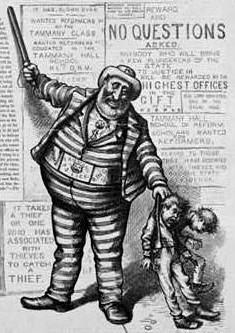Posted by Brooklyn Daily Eagle on 11:00:30 10/19/05
Search for New Brooklyn Dem Leader
Tempered by Norman Fallout
Reform Seen as Chief Issue for Party’s Leadership
By Charles Sweeney
Brooklyn Daily Eagle
ADAMS STREET-- Amid the fallout from Tuesday’s conviction of party leader Assemblyman Clarence Norman on felony election law violations, the beleaguered, divided and temporarily leaderless Brooklyn Democratic Party must now embark on the process of replacing the 15-year county leader.
While the rumor mill swirls with names to fill the now-vacant position, political observers say the maneuvering has already begun. While veteran observers may disagree as to whom the party’s pick will eventually be, there is, however, a consensus that Norman’s conviction is likely to spur an effort to bring long-needed reform to local politics.
“The message here is that the public wants reform,” said long-time political observer Hank Sheinkopf. “After all, they elected a reform surrogate (Margarita Lopez-Torres).”
Sheinkopf added that Norman’s conviction, “and the loss to him and his family” will give reformers “more room to push for change.”
Sheinkopf credits Hynes’ dogged pursuit of Norman-- a three-year
investigation that began with information uncovered during a judicial corruption probe-- with creating an atmosphere of reform within the Democratic Party.
“Hynes has recaptured the mantle of reform,” Sheinkopf told the Eagle. “After a difficult campaign and a difficult trial he’s recaptured the mantle of reform.”
Such reform may be slow in coming, Sheinkopf warned, and not without what he called “furious back-room politicking,” as candidates for the party chairmanship vie for position and support amongst themselves.
“The most difficult part of this campaign for party leader is going to be individuals’ cell phone bills,” Sheinkopf said, alluding to the positioning already going on among district leaders across the borough.
Rumors have floated different names for the vacant post, with one source telling the Eagle that there were three frontrunners for the position: Assemblyman James Lentol, a well-liked assemblyman who recently backed away from accepting the newly-created Surrogate’s position; Assemblyman Barryl Towns, the popular son of Congressman Adolphus Towns; and Joe Bova, a district leader from Bay Ridge.
Charges that Norman will have a hand in picking his successor were dismissed by one veteran political analyst, discounting the notion that Norman retains enough power and influence to affect the outcome of any county-wide election among district leaders for the leadership position.
“He couldn’t pick the DA, or the Surrogate,” the source said. “There’s no way he’s going to be able to pick his own replacement.”
While no vote is scheduled in the near future, Sheinkopf said once a new leader is chosen the first item on the agenda would be the reform of the judicial selection process, long a source of lucrative patronage for past generations of Brooklyn political bosses.
One of the three still-current indictments against Norman stems from the abuse of that process, specifically the outright sale of Supreme Court judgeships and the extortion methods Norman is charged with employing with respect to civil court judges-- a scheme involving a quid-pro-quo that required civil court judge candidates to use Norman-connected political consultants in exchange for running on the Democratic ticket. Prosecutors charge that Norman’s scheme was designed to essentially extort payments to the party for endorsements for judicial candidates.
That indictment, in which Norman and Kings County Democratic Committee Chairman Jeffery Feldman are charged with Grand larceny, Extortion and Conspiracy, is currently pending appellate review.
According to the indictment, Norman and Feldman are charged with demanding Judges Karen Yellen and Marcia Sikowitz “campaign jointly, use a vendor designated by the defendants to produce campaign literature…and pay another person designated by the party to run campaign ‘operations’ in Central Brooklyn during the campaign and on primary day,” all under the threat that their party endorsements would be pulled.
Such tactics have long been employed in the area of Brooklyn politics, giving the borough’s judicial selection process the taint of corruption, something Hynes’ office has been laboring to address over the past three years.
In the third indictment against Norman, in which he is accused of cashing and pocketing a $5,000 check meant for his re-election committee, Supreme Court Justice Martin Marcus Tuesday set a date for jury selection. Norman’s attorneys and prosecutors will be back in Supreme Court on November 7th to select a jury for a trial in which Norman faces charges of grand larceny.
The fourth indictment of Norman concerns double-billing the state for travel expenses. In the so-called “travel voucher case,” Norman is accused of seventy-six counts of offering a false instrument for filing, that is, handing in travel vouchers for trips to and from the state capital in Albany.
Norman contends the reimbursements he sought were legal. Up until his conviction Tuesday and the subsequent loss of his assembly seat, Norman had continued the controversial practice. That trial is also the subject of appellate review, with Norman’s attorney’s arguing Hynes’ office lacks jurisdiction in the case.
While the ultimate fate of Norman rests in the hands of the courts, there is no disagreement among experts that Tuesday’s convictions marked the end of an era in Brooklyn politics. Whether the party can rebound from the taint of corruption remains to be seen, but as lead prosecutor in the Norman case Michael Vecchione put it outside the courtroom Tuesday after the guilty verdicts were read, “I think that the world of Brooklyn politics will not be the same after today.”
For some political observers and democratic reformers, that day could not have come soon enough.
Follow Ups:





